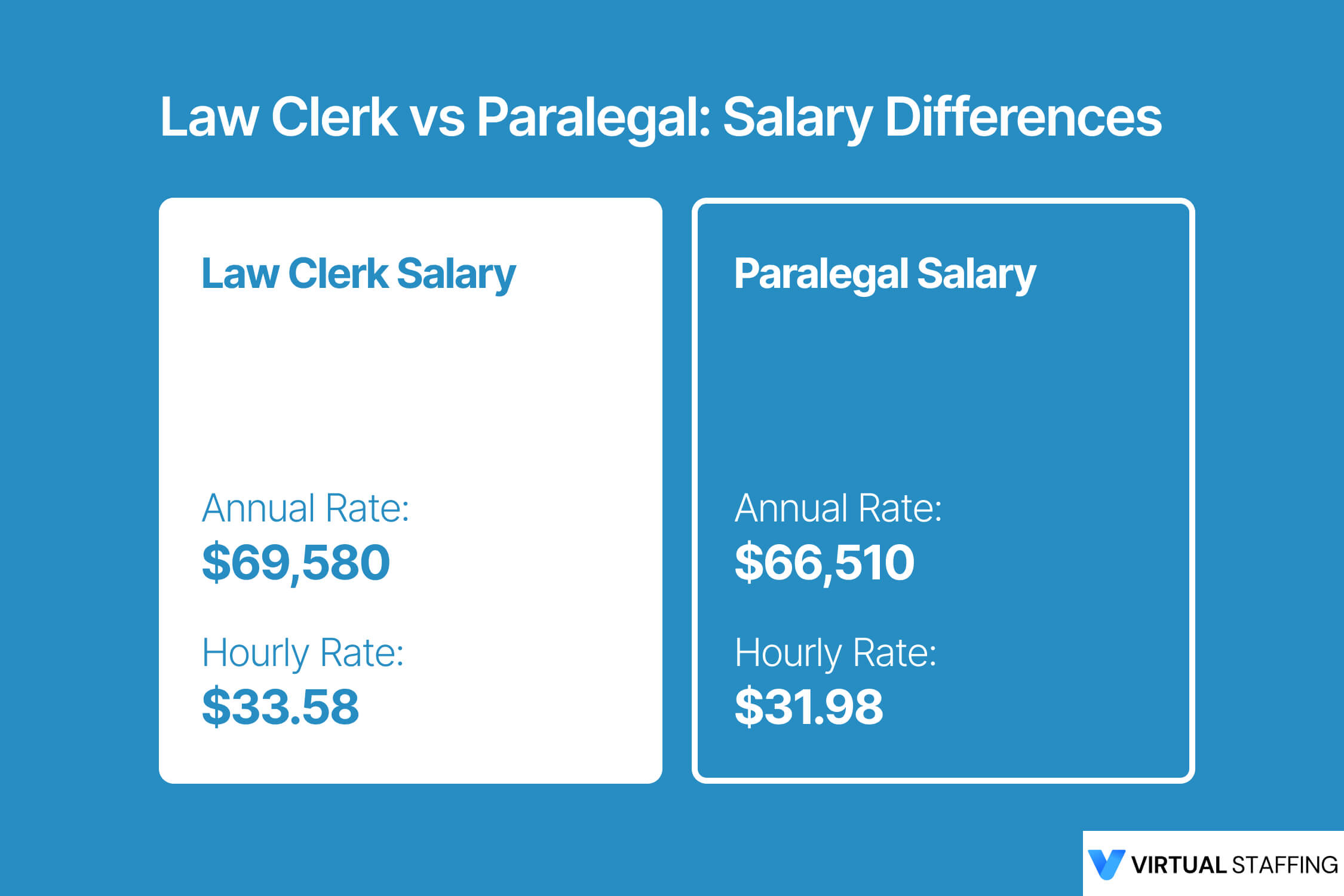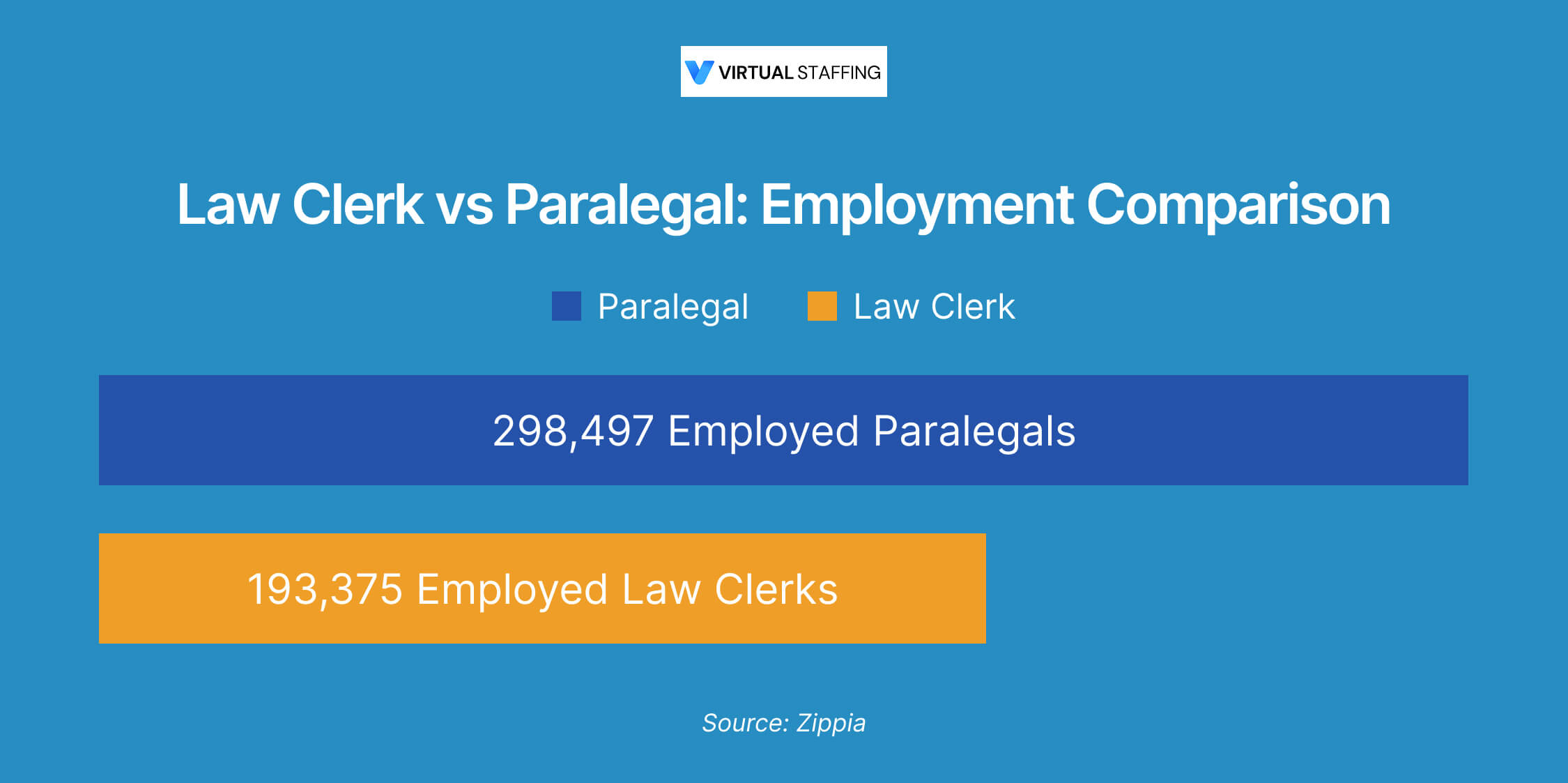The foundation of many successful law firms lies in their ability to bring full dedication and expertise to every client and service they handle. But maintaining this level of excellence is no small task, especially when firms must juggle many responsibilities and make important decisions along the way. One of the most crucial decisions is choosing the right support to delegate their workload.
This is where paralegals and law clerks come in. Behind the scenes, these two key legal professionals play essential roles in keeping legal operations running smoothly. While their responsibilities sometimes overlap, each serves a distinct purpose and brings unique value to a law practice.
Whether you’re considering a career in law or building your own legal team, understanding the differences between these roles can make all the difference in navigating the legal landscape effectively.
Key Takeaways
- Paralegals handle a broader range of tasks compared to law clerks.
- Law clerks typically earn higher salaries than paralegals because of their more advanced legal education.
- Paralegals often pursue long-term careers in legal support, while law clerks usually view their roles as short-term training before becoming licensed attorneys.
What is a Law Clerk?
A law clerk is typically a law student or recent law graduate who assists judges, attorneys, and legal departments by conducting legal research, analyzing cases, and drafting legal documents. Their role is often seen as a stepping stone to becoming a licensed attorney, allowing them to gain practical experience and develop their legal skills.
Law clerks focus primarily on research and writing, rather than the administrative or procedural tasks that paralegals handle. In a judicial setting, law clerks work closely with judges to review case filings, draft opinions, and evaluate legal arguments. Within law firms, they support attorneys by researching complex legal issues and preparing trial briefs or memoranda.
While paralegals are legal professionals who build lasting careers in legal support, law clerks are usually future attorneys gaining hands-on training and exposure to the practice of law.
What is a Paralegal?
A paralegal is a legal professional who provides support to attorneys by performing tasks that require knowledge of legal concepts, such as legal research, drafting legal documents, assisting with client communication, and managing case files.
Paralegals typically hold a degree in paralegal studies or a certification from a recognized paralegal association. While paralegals are not licensed to practice law and cannot provide legal advice, they play an integral role in the day-to-day operations of a law practice.
Unlike law clerks, paralegals are career legal professionals who may specialize in assisting lawyers in fields such as family law, intellectual property law, or corporate law, building long-term expertise in their chosen area.
Law Clerk vs Paralegal Difference in Daily Responsibilities
While both roles support attorneys, their daily responsibilities differ in focus and purpose.
Law clerk responsibilities
They primarily engage in substantive legal analysis, research, and drafting, including:
- Conduct in-depth legal research on case law, statutes, and legal precedents
- Draft legal memoranda, judicial opinions, and trial briefs
- Prepare appellate briefs and motions
- Assist judges with opinion writing and case review
- Analyze case law and evaluate legal arguments
- Assist with trial preparation and courtroom procedures
- Review and summarize depositions, pleadings, and trial transcripts
- Verify legal references and citations
- Manage case files and organize legal evidence
- Observe court proceedings and depositions
Paralegal responsibilities
They primarily focus on the practical and administrative aspects of legal work, including:
- Organize and manage case files
- Draft routine legal documents
- Assist with billing and time tracking
- Conduct factual research under attorney supervision
- Interview clients and witnesses
- Prepare deposition summaries and trial exhibits
- Manage attorney calendars and track deadlines
- Maintain electronic filing systems and databases
- File legal documents with courts and agencies
- Collect, organize, and review evidence or case records
Differences in Education for Law Clerks vs Paralegals
The educational requirements for law clerks are typically more advanced than those for paralegals, as their training prepares them for the practice of law. Law clerks are usually enrolled in a Juris Doctor (JD) program or have recently graduated from one. This means they’ve completed a four-year bachelor’s degree followed by three years of law school. Some may also pursue a Master of Laws (LL.M.) degree to further strengthen their academic credentials.
In contrast, paralegals typically hold an associate degree in paralegal studies, a bachelor’s degree, or a paralegal certificate from an accredited institution. These programs generally take anywhere from several months to four years to complete, depending on the level of education pursued. Some paralegals enter the field as legal assistants and transition into paralegal roles through on-the-job training, although formal education and certification are generally preferred in the industry.
Law Clerk vs Paralegal: Salary Differences

According to the U.S. Bureau of Labor Statistics’ 2024 Occupational Employment and Wage Report, law clerks typically earn higher salaries than paralegals, reflecting their more advanced legal education and training. However, salaries for both roles vary widely depending on factors such as location, experience, and employer type.
- Law clerks earn an average of $69,850 per year, with an hourly rate of $33.58.
- Paralegals earn an average of $66,510 per year, with an hourly rate of $31.98.
While salary ranges may overlap, law clerk positions often provide greater flexibility in salary negotiation due to the temporary or project-based nature of many roles. In contrast, paralegal salaries tend to follow more standardized market rates within law firms and corporate legal departments.
Law Clerk vs Paralegal: Employment Comparison

In the United States, paralegals outnumber law clerks by a significant margin. On average, there are approximately 298,497 employed paralegals, with women representing about 77.6% of the workforce. In contrast, there are around 193,375 employed law clerks, with a more balanced gender distribution—52.5% men and 47.5% women.
Paralegals are typically full-time professionals with long-term career growth opportunities within law firms, corporate legal departments, and government agencies. Law clerks, on the other hand, often work in temporary or short-term roles within court-house settings, directly assisting judges in the courtroom.
Law Clerk vs Paralegal Main Differences
Understanding the distinction between a law clerk and a paralegal is important for individuals exploring a career in law, as well as for legal professionals seeking the right type of support for their practice.
Here are 3 main differences between law clerks and paralegals:
- Paralegals handle a broader range of tasks, focusing on both administrative support and substantive legal work under attorney supervision. Law clerks, in contrast, concentrate heavily on legal research and writing, much of their work is academic and assists attorneys or judges in interpreting and applying the law.
- Law clerks are typically pursuing or have completed a Juris Doctor (JD) degree, viewing their positions as temporary training before becoming licensed attorneys. Paralegals, on the other hand, usually hold an associate or bachelor’s degree along with a paralegal certificate, and pursue this as a long-term career path, developing deep expertise in their chosen legal specialty.
- Law clerks often have less direct contact with clients, as their work primarily revolves around assisting judges. Paralegals, by contrast, regularly interact with clients, since their role involves gathering information, providing case updates, and coordinating communication between clients and attorneys.
What Are Their Benefits?
Both paralegals and law clerks bring distinct advantages to legal practices. Their contributions complement each other and strengthen the efficiency of your legal team.

Paralegal benefits
- Cost-effective support: Paralegals provide legal assistance at a fraction of the cost of attorneys. This allows firms to offer more competitive rates to clients while maintaining healthy profit margins.
- Long-term stability: Paralegals often build long-term careers within law firms, developing a deep understanding of your practice areas, systems, client relationships, and firm culture.
- Increased productivity: By handling routine administrative tasks, paralegals free up attorneys’ time to focus on billable work and client development.
Law clerk benefits
- In-depth legal analysis: With their advanced legal education, law clerks are equipped to conduct complex legal research, particularly valuable for firms handling appellate cases or matters requiring extensive legal analysis.
- Fresh perspectives: Law clerks bring current knowledge of case law, emerging legal trends, and academic insights gained from recent coursework.
- Professional network: Working with law clerks creates opportunities to build professional connections through their interactions with judges, court staff, and attorneys.
Choosing the Right Legal Support
Deciding whether to hire a paralegal or a law clerk, or both, depends on your firm's specific needs, workload, and stage of growth. If you require day-to-day support with case management, document drafting, and client communication, a paralegal is an invaluable asset. If your practice involves complex appellate work, novel legal issues, or matters requiring extensive research and legal writing, adding a law clerk makes sense.
Each role plays a vital part in improving legal efficiency and ensuring that attorneys, judges, and legal departments receive well-rounded legal support. If you’re evaluating your budget, workload composition, and long-term growth plans, Virtual Staffing provides access to a network of skilled legal support professionals trained to deliver personalized assistance to every practice. Schedule a consultation today to explore detailed talent profiles.

Frequently Asked Questions
Are paralegals and law clerks the same thing?
No, they are distinct roles with different educational backgrounds, responsibilities, and career paths, although both provide essential legal support.
Can a paralegal become a law clerk?
Yes, it’s possible for a paralegal to become a law clerk by enrolling in law school and pursuing a Juris Doctor (JD) degree.
Do law clerks need to pass the bar exam to work?
No, law clerks do not need to pass the bar exam to perform their duties. However, they must be enrolled in a Juris Doctor (JD) program or have graduated from one to be considered for a law clerk position.




